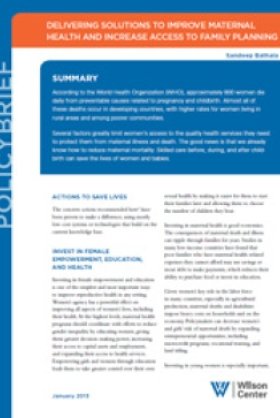Delivering Solutions to Improve Maternal Health and Increase Access to Family Planning





According to the World Health Organization (WHO), approximately 800 women die daily from preventable causes related to pregnancy and childbirth. Almost all of these deaths occur in developing countries, with higher rates for women living in rural areas and among poorer communities.
Several factors greatly limit women’s access to the quality health services they need to protect them from maternal illness and death. The good news is that we already know how to reduce maternal mortality. Skilled care before, during, and after childbirth can save the lives of women and babies.


Housed within the Wilson Center's Environmental Change and Security Program, the Maternal Health Initiative (MHI) leads the Wilson Center’s work on maternal health, global health equity, and gender equality. Read more


The Environmental Change and Security Program (ECSP) explores the connections between environmental change, health, and population dynamics and their links to conflict, human insecurity, and foreign policy. Read more



